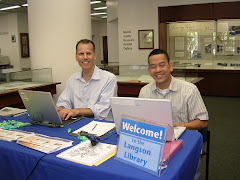According to Howard G. "Ward" Cunningham, who is credited with developing the first wiki, a wiki is “The simplest online database that could possibly work.” Wikipedia, which ought to be definitive on the matter, defines a wiki as “software that allows users to create, edit, and link web pages easily. Wikis are often used to create collaborative websites and to power community websites."
Benefits of using Wikis include:
- Anyone can add, edit or delete content.
- Tracking tools within wikis allow you to easily keep up on what has been changed and by whom.
- Earlier versions of a page can be viewed when needed.
- Wikis use simple syntax structure, users do not need to know HTML to add and edit content.
(Adopted from School Library Learning 2.0: A similar project)
Popular wikis include the collaborative encyclopedia, Wikipedia and its relative, the community news site WikiNews. Library-related wikis including the Book Lovers Wiki at the Princeton Public Library, the ALA Midwinter Meeting Wiki, and the ALA Professional Tips Wiki.Wiki Farms, such as Wikia, are directories of diverse wikis.
Behind every wiki is specialized wiki software mounted on a web server. Popular Wiki software packages include DekiWiki, MediaWiki, and PMWiki. To get an idea of how they compare to each other, see Wikimatrix.
In the UCI Libraries, several efforts are underway to use wikis for collaboration. Public Service has a wiki as does Collection Development. EEE recently launched a Wiki open to the entire campus community.
For more information about wikis, here is a video tutorial that is fun and short:
Exercise 1
Spend some time browsing popular and Library-based wikis, for example:
- Wikipedia
- WikiNews
- 1911 Encyclopedia Wiki version of the renowned 1911 Edition of Encyclopaedia Britannica
- Ohio University Libraries - Biz Wiki
- Oregon State University Libraries Wiki
- University of South Carolina Aiken Library USC Aiken’s Library site built using PMWiki.
Exercise 2
Create and edit Wiki pages on the Public Services , Collection Development Wiki (or any wiki of choice). It is up to you what you want to add. If you went to Midwinter, you might want to post your conference notes on the conference notes page . If you don’t know what to add, you can try editing pages in the WikiSandbox, a page where you practice without messing up existing pages.
Editing or adding a page using PMWiki is straightforward:
- Go to either the Public Services or Collections Wiki and navigate to the page you would like to edit. Click on the “edit” link in the upper right of the page you want to edit; this will open up the editor and enable you to edit or add new content to a page. In order to edit in PMWiki, you may need to use some coding, basic codes are listed beneath the editing window.
- If you want to add a new page to a wiki, open the page you would like to link the new page and open the editor, then add a link to a new page by typing: [[Title of New Page]]
The brackets “[[ ]]” indicate that you are linking to another page. If the page does not exist already, the wiki will automatically create one . - Once you have added a new page, type in your name as the person making the edit and click “save.” When you save, you should see your new link on the page.
- To add content to your new page, click on the new link to go to your page, then click “edit” to add your content.
- Go to the Conference Notes page and open up the editor.
- First, you will need to create a new page for your report by typing: #[[Title of New Page]] at the end of the existing list of reports.
- In this case, # indicates you are adding to a numbered list and the brackets “[[ ]]” indicate you are linking to another page.
- Save your changes.
- To add conference notes. Click on the link you created, and edit the page to add your content.
The EEE Wiki, uses MediaWiki, provides a good comparison if you want to see how another wiki software works.
Exercise 3 (Optional)
Blog about your experience – comment on the exercises / what you like, didn’t like / other wikis you found useful/interesting / reflect on possible uses…


No comments:
Post a Comment